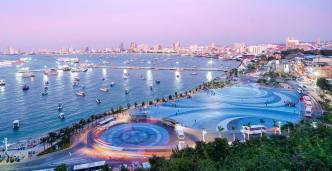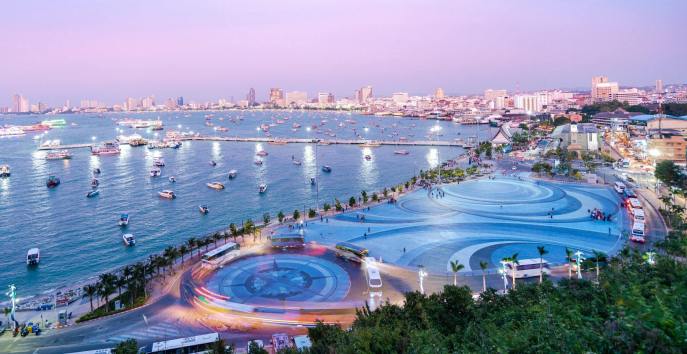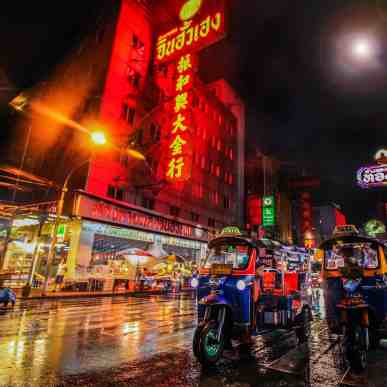Thailand offers a variety of visas if you want to stay in the country for an extended period. In this post, we’ll go over some of the most popular visas in Thailand and what you need to know to apply for them. Whether you’re planning to study, work, or retire in Thailand, there’s a visa that’s right for you.
Tourist visa to enter the country
For temporary stay (up to 30 days), most nationalities can enter without a visa under the Visa Exemption scheme. If you’re not eligible, you can apply for a 15-day visa on arrival.
A single-entry tourist visa
If you want to stay longer than 30 days, you can apply for a 60-day Single Entry Tourist Visa. You can do it online or in a Thai Embassy in your country of residence.
Validity: The visa is valid for three months from the date of approval, which means you have three months to enter Thailand from the date your visa is approved.
Once in Thailand, you will receive a ‘permit to stay’ stamp in your passport for 60 days.
The required documents: a current passport with at least six months validity and two blank pages, a printout of the visa application form submitted online, travel booking confirmation, proof of accommodation in Thailand, financial evidence, and confirmation of legal residence in the country where you apply for the visa if you are not a citizen.
Costs: $30—$50, depending on where you apply.
When you arrive in Thailand, you need to provide your passport with the approved visa attached (if you applied at an embassy), a confirmation letter of visa approval (if you applied online), a confirmed exit flight from the country, confirmed accommodation, and a financial statement or bank statement showing funds available.
If you want to extend your 60-day stay, visit a local Thai Immigration Office before your tourist visa expires.
You must pay 1900 Thai Baht in cash when applying for the extension. Thai Immigration offices are not open on weekends.
Are border runs still an option?
The Thai immigration law limits the 30-day Visa Entries to 2 border runs per year.
If your nationality is on the Visa Exemption List and you are entering Thailand via border posts at Cambodia, Laos, Myanmar, and Malaysia without securing a prior visa, the border control will give you a 30-day visa exemption stamp two times per calendar year, from January 1 to December 31. That means you can enjoy three total stays a year, each is 30-days long.
The multiple-entry tourist visa
This visa is valid for six months and allows you to stay in Thailand for up to 60 days at a time.
You can extend your stay for an additional 30 days at an immigration office for a fee of 1,900 THB.
The METV costs $200, and you can only apply outside Thailand. It’s a good option if you travel frequently and want flexibility. However, it’s more expensive than the Single Entry Tourist Visa.
Retirement visa O-A
The Non-Immigrant “O-A” Visa is specifically for retirees aged 50 years and above who wish to live in Thailand long term.
Eligibility: You must be at least 50 years old, have proof of retirement or pension income of at least 65,000 THB (approximately $2,050) per month, or have a bank account in Thailand with a minimum balance of 800,000 THB (about $25,200), or a combination of both.
Application process: You must apply at a Thai embassy or consulate outside of Thailand or the Thai Immigration Bureau within the country. Required documents may include a valid passport, proof of retirement or pension income, bank statements, and other supporting documents.
Length of stay: A retirement visa allows you to stay in Thailand for one year, with the option of renewing for an additional one-year period. After that, you have to re-apply.
Reporting requirements: Retirement visa holders are required to report their residential address to the Thai Immigration Bureau every 90 days and to update their financial status every year.
Retirement Visa (O-X) for 10 years in Thailand
Purpose: This visa is for people aged 50 and above who want to stay in Thailand for up to 10 years without working.
Eligibility: You must be at least 50 years old, have a passport from eligible countries, such as Japan, Australia, USA, Canada, etc., and apply at the Thai Embassy or Consulate in your home country. You must have no criminal record, no prohibitive diseases, and not be prohibited from entering Thailand. You need to have either 3 million bahts in a Thai bank or 1.8 million bahts in a Thai bank and an annual income of at least 1.2 million bahts. You also need Thai health insurance coverage for outpatient treatment of at least 40,000 bahts and inpatient treatment of at least 400,000 bahts.
Validity: The visa is valid for five years from the date of issue and can be extended for another five years at the Immigration Bureau. After that, you have to re-apply.
Period of stay: You can stay in Thailand for up to 5 years at a time, for ten years.
Required documents: A valid passport, completed visa application forms with photos, a bank statement or proof of income, a letter of verification of no criminal record, a medical certificate, and health insurance.
Health insurance for A-O and A-X visas
When you come to your local immigration office to apply for a retirement extension, you must have a health insurance policy from an approved Thai insurance provider. The approved providers are LMG, The Viriyah, Pacific Cross, Falcon, Thaivivat, AXA Insurance Thailand, Navakij, Dhipaya, Asia Insurance, Aetna and Sompo Insurance.
Your policy must cover a minimum of 40,000 Baht outpatient and 400,000 Baht inpatient costs.
The Thai Elite Visa
This visa is the best way to avoid lengthy bureaucracy and paperwork. You will only need to send the required documents and then turn up in person when the visa is issued at the Thai Embassy abroad, at Suvarnabhumi Airport, or at the Bangkok immigration office, whichever is more convenient for you. In short, you pay a required fee (a membership fee), and an elite visa agent will do everything needed to obtain this visa.
Required documents: a copy of the profile page of your passport, a coloured ID photo with white background, a completed Thai Elite Visa application form, and a copy of proof of relationship for any family member applying with you.
The application process: Through a specialized agent. The application process takes 4 to 12 weeks.
Here are the costs and benefits of various Elite Visa packages:
Elite Easy Access: Valid for five years, costs 600,000 Thai baht with no annual fee, and no age restrictions.
Elite Family Excursion: minimum two persons, valid for five years, costs 800,000 Thai baht for two people and 300,000 Thai baht for every additional family member. No annual fee.
Elite Family Alternative: valid for five years and renewable for another five years, costs 800,000 Thai baht for the main applicant and 700,000 Thai baht for every additional family member. No annual fee.
Elite Privilege Access: valid for five years and renewable for another five years, costs 1,000,000 Thai baht with no annual fee. For an additional family member, there is a fee of 800,000 Thai baht.
Elite Superiority Extension: valid for five years and renewable three times each time for another five years, costs 1 million Thai baht. No annual fee.
Elite Ultimate Privilege: valid for five years and renewable three times each time for another five years, costs 2.14 million Thai baht. Annual fee of 21,400 Thai baht. Members must be over 20 years old. Plus, some very attractive complimentary services are thrown into this package.
Elite Family Premium: available only for family members of Elite Ultimate Privilege members, valid for five years and renewable three times each time for another five years, costs 1 million Thai baht with an annual fee of 10,000 Thai baht.
The Elite Visa summary
Length of stay: The Thai Elite Visa holder can stay in the country for up to 1 year on each visit.
Validity: The Elite Visa is a five-year multiple-entry visa with a one-year extendable length of stay per entry.
Details:
- The Thai Elite Visa financial requirement (membership fee) is non-refundable.
- The visa doesn’t need to be renewed every year.
- You don’t have to pay income taxes in Thailand as a Thai Elite Visa holder, and you can own condominiums or obtain a long-term lease on the land to build a house.
- A 90-day address reporting requirement can be done on your behalf.
- Buying healthcare insurance is not a requirement.
Privileges and benefits: the more expensive the package is, the more benefits and privileges you can enjoy, including free access to airport lounges, airport transfers, golf and spa access, complimentary health check-ups, etc.
The long-term resident visa (LTRV)
The Long-Term Resident Visa is only available to four categories of wealthy foreigners: Wealthy Global Citizens, Wealthy Retirees, Work From Thailand Professionals, and Highly Skilled Professionals.
Wealthy Global Citizens must have at least $1,000,000 USD in assets, a personal annual income of at least $80,000 USD in the last 2 years, and make an investment of at least $500,000 USD in Thai Government bonds, foreign direct investments, or Thai property.
Wealthy Pensioners must be over 50 years old and have an annual or stable income exceeding $80,000 USD. If the pensioner earns less than $80,000 USD per year, they must invest $250,000 USD in Thai Government bonds, foreign direct investments, or Thai property.
Work From Thailand Professionals must have a minimum personal income of $80,000 USD per year in the past two years or a master’s degree or above, own intellectual property, or receive Series A funding. They must also work for a public company on a stock market or a private company in operation for at least three years with a combined revenue of at least $150 million USD in the last three years.
Highly Skilled Professionals must have a minimum personal income of $80,000 USD per year in the past two years or a master’s degree or above in science and technology or special expertise relevant to the job assignment in Thailand. They must also work for businesses in any targeted industries, higher education institutions, research institutions, specialized training institutions, or Thai Government agencies.
Family members of LTR Visa holders, including spouses and children under 20 years of age, can also be granted similar visas.
Health insurance is required for all categories of LTR Visa holders, with a minimum coverage of $50,000 USD or a deposit of at least $100,000 USD.
Education visa
If the visas mentioned above don’t tick the boxes, another alternative is an Education Visa.
Purpose: With this visa, you can study Thai, martial arts, Buddhism, massage, yoga, Thai cooking or any other discipline in Thailand.
Eligibility: courses must be booked in a school or organization accredited by the Ministry of Foreign Affairs.
Application: You have to apply from outside of Thailand. If you are already in Thailand, you can apply from any neighbouring country once you book the course and receive the confirmation.
Validity: The visa is valid for 90 days
Period of stay: The initial 90-day visa can be extended to 8 months. If you enrol in a longer course, you must apply for a new ED Visa after eight months to finish the course.
Required documents: passport valid for at least six months, a completed visa application form, 4cm x 6cm photo taken in the last six months, letter of acceptance from the school, if you are taking a private course, an official letter from the Ministry of Education of Thailand that was mentioned above. Your school will provide a complete list of required documents. There may be other documents. Your school will consult you on this.
90-day reporting requirement
Holders of Non-Immigrant visas, as a rule, must report their current address to a Thai immigration office every 90 days. This can be done in person at the Thai immigration office, by mail, or through an agent with a Power of Attorney.
If you are outside Thailand on the date your 90-day reporting is due, you do not need to report your status. Your 90-day reporting will begin again from the day you re-enter Thailand.
Other visa options
If you’re married to a Thai national, you can apply for a Marriage Visa. You first need to obtain a non-immigrant visa and then convert it to a Marriage Visa that allows you to stay in Thailand for the whole year without leaving the kingdom or going to the border.
If you want to do business legally in Thailand, you can apply for a Business Visa, also known as a Non-Immigrant Business Visa. With this visa, you can get a work permit and open a bank account, but you’ll still need to do a visa run every 90 days.
Converting your existing visa to a Permanent Resident Visa
Finally, if you’ve been in Thailand for three consecutive years with one-year visa extensions, you can apply for a Permanent Resident Visa.
There are income requirements. You must present your three years of personal tax statements proving that your monthly income is at least 80,000 Baht.
What’s there for digital nomads?
The main issue with the above options is that nothing caters explicitly to digital nomads. Meanwhile, there’s a big community of digital nomads in the country who usually use a combination of tourist visas and frequent border runs, ED visas or other suitable options from the list.
Re-entry permits for single-entry visa holders
The majority of the affordable options are single-entry visas. If this is your case and you must travel out of Thailand and return during your stay, get a re-entry permit before leaving the country. The permit can be bought at the airport or an immigration office. Currently, the fees are 1,000 Baht for a single re-entry, and 3,800 Baht for a multiple re-entry permit.
Final thoughts on visa and residency options in Thailand
As you can see, the visas available are more geared towards people who want to study, work, or retire in Thailand.
If you plan to retire, there are some solid options residence-wise, with an O-A visa being the most affordable variant. That being said, there are some options available for digital nomads, although the affordable ones only allow for short-term stays and require you to leave the country frequently.
So, if you’re a digital nomad looking to stay in Thailand for a while, you’ll need to do some research and figure out which visa works best for you. It’s not a perfect system, but with a little planning, you can make it work.
You might find useful:
- The Cost Of Living In Thailand – a complete guide
- Best Places To Live In Thailand
- Moving To Thailand Guide
- Best Places To Retire In Thailand
- Didn’t find what you were looking for? Comment with your question, and we will do our best to help.
- Need help relocating to Thailand? Contact us.















Hi Olga, my wife and I have been living on north Cyprus for fifteen years, and have decided to move on, Thailand being one of the places we are interested in.
We are both retired, receiving UK state pensions, and my military pension. We also have some savings.
In short, what would be the best visa, health insurance, to allow us to stay for – could be the rest of our lives?
And, can all this be done online, or best to get in country to sort things out?
Regards, Malcolm.
Hi Malcolm, thanks for the comment. Has North Cyrus become a bit too small for you? I lived there for a while and have very sweet memories of the place…
Regarding Thailand, the best visa option for you is any subcategory of the retirement visa. Probably, committing to the O-X visa at once is not very wise unless you are absolutely sure that Thailand is your destination. You might want to opt for O-A first. If you want to apply for a retirement visa (let’s say O-A) you can do so in South Cyprus in Nicosia – there’s a Thai Consulate. It might be worth giving them a call and having a chat about the exact list of documents they want. Another options (the easiest) is to enter Thailand as tourists and sort everything out in the country. You will need some help for this. You can find services there to help you, or I can put you in touch with a relocation advisory who has an advisor in Thailand who can organise everything for you from legalities to helping with housing, health insurance, advice on the areas, etc. Let me know if you are interested.
Wishing you all the best,